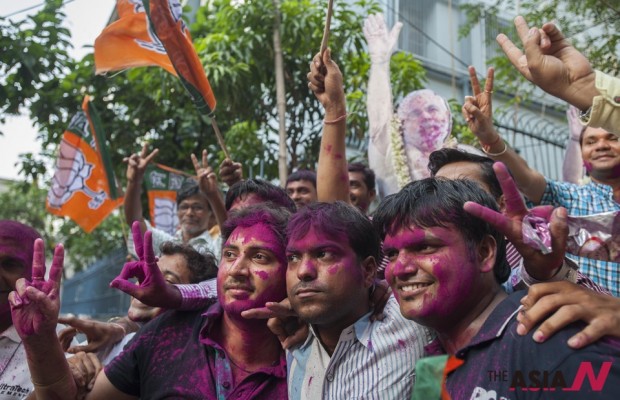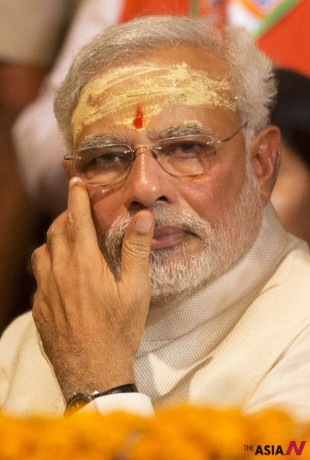New Delhi: Genesis of Tectonic Shift in Politics
The feeble rumblings of an impending fundamental tectonic shift in Indian politics were heard in New Delhi in a series of public meetings. They were addressed by non-political civil society organizations for the past three years.
Essentially, the discourse of these public meetings emanated from sheer rampant corruption in public life. This was intrinsically linked to the arrogance and subterfuge employed by the ruling dispensation of a 128-year old Indian National Congress, a party that has ruled for most of the decades after India attained independence in 1947.
Public meetings gave way to almost daily street protests on some issue or the other. Across big and small towns, young Indians came out in millions on the streets, bracing against police, anti-riot and security agencies. India was galvanized against the establishment. The pot boiled over and the media lapped it up as a prime-time spectacle.
Millions of young Indians protest
At one time, it seemed that India was up for an “Arab Spring” kind of uprising that may lead to an unprecedented forced quelling of street violence. Young boys and girls, parents with small children in their arms and even those born in the pre-independence era, were expressing their anger by shouting slogans against crony capitalism and a corrupt government.
The vocal ruling Congress party ministers, spokespersons, well-ensconced left-of-center intellectuals, Congress apologists and political allies – all ganged up. They launched a bitter attack on national media. It was targeted against the so-called misguided civil society campaign against the democratic sentiments of a tolerant nation, which was liberated from the clutches of the British by nationalist freedom fighters led by Gandhi in a non-violent movement.
During the past ten years, India’s economic story simply kept fading out with GDP growth at 4.9 per cent – almost 40 per cent less than a decade back – and fiscal deficit at 4.8 per cent. Rising prices of commodities and inflation provided impetus to negative sentiments against a government that committed repeated blunders and found itself in the midst of innumerable scams in recent years.

Supporters of India’s main opposition Bharatiya Janata Party (BJP) celebrate the parliamentary election results in Calcutta, capital of eastern Indian state West Bengal, on May 16, 2014. (Photo : Xinhua/NEWSis)
One disastrous decision after another
However, the bombshell that sent a chill running down the spine of the corporate world was retroactive taxation. The retroactive tax proposal of the Finance Minister would have required Vodafone to shell out over 2 billion US dollars to the government. The decision marred the investment climate and sent a wrong message to the global investor community. The Vodafone matter is still pending a decision by the Indian courts.
The worst was inevitable and the rupee went into a tailspin against the dollar in August last year, leading to curbs on gold imports.
The Finance Minister explained the disastrous industrial and economic policies on the floor of the upper house of the Parliament. He admitted and stated, “One of the domestic factors is that we allowed fiscal deficit to be breached and we allowed current account deficit to swell because of certain decisions that we took during the period 2009 to 2011.”
The government continued to stumble from one disastrous decision to another. Public outrage continued to swell against an ineffective Prime Minister, an overactive Congress party President, and the extra-constitutional policy making shadow government called “National Advisory Committee” (NAC), which reported directly to Congress President Sonia Gandhi.
Naturally, there was a vacuum created by inaction and two power centers of governance coupled with increasing dissent on the streets of New Delhi. This was filled by a new political party spearheaded by Arvind Kejriwal, an honest and upright revenue service middle level bureaucrat, who had closely watched the gallop of crony capitalism.
The first electoral test of this political party launched by the bureaucrat-turned-politician was in the 2013 Delhi legislative assembly election. It emerged as the second-largest party, winning 28 of the 70 seats. With no party obtaining an overall majority, his party, the Aam Aadmi Party (common man’s party), formed a minority government with conditional support from the Indian National Congress of Sonia Gandhi. The first point in its election manifesto had been that within 15 days, it would pass a bill for a strong ombudsman position. This ombudsman would investigate charges against all political leaders, including that of the Congress, on a priority basis. When it became clear that the other major parties would not support this bill, the government resigned after 49 days.
In this backdrop, four more state assemblies went to the polls in December last year. The ruling Congress party lost three states to its main opposition, the Bharatiya Janata Party and retained only one state.
BJP is the nationalist right-of-center party that ruled India for one full term under Atal Bihari Vajpayee, a statesman and stalwart, who had unseated the Congress and was Prime Minister for five years until 2004.
By the time the election commission was to announce national elections to install a new government in New Delhi, the stage was already well set. Defeat was certain for the government headed by Prime Minister Manmohan Singh, who was completely helpless in many ways. His authority as the head of the government was eroded by his own party President, Sonia Gandhi, and members of his cabinet, who disregarded his command on a daily basis.
The young scion of the Nehru-Gandhi dynasty, Rahul Gandhi, also the Vice-President of the Congress party, greatly contributed to eroding the dignity of the office of the Prime Minister of India.
During an on-going press conference called by the party spokesperson in New Delhi – and in full public view – Rahul Gandhi said that the government’s ordinance, which negates a Supreme Court’s order that ruled that convicted lawmakers cannot continue in office, is “complete nonsense”. Therefore, the ordinance should be “torn up and thrown out”. He also said the cabinet headed by Prime Minister Singh took a wrong decision in approving the ordinance proposal.
Prime Minister Singh and his cabinet remained moot spectators to this high political drama. Such was the power the Nehru-Gandhi dynasty commanded and it was such unconstitutional actions that prepared the ground for a complete rout of the Congress party in the general elections in early May 2014.
The shrill voices of status quoists across the board could be heard on a high-pitched fierce media campaign. The battlefield was left wide open by the principal ruling political party and the fledgling new party of the bureaucrat-turned-politician, Arvind Kejriwal.
Election Commission officials said, as many as 694 cases of paid news – news for which media organisations took money to publish or broadcast – were detected by the Commission in this election. By the time the nine phases of the 16th election polls ended on May 12, thousands of cases of paid news were reported. Notices were issued by the Commission in 3,053 cases.
However, India voted and presented a result that stunned the entire political class across parties. Narendra Modi of BJP, three times Chief Minister of the most progressive state of Gujarat, hammered the last nail. Scores of political parties could not even open their account and the arrogant Congress party was completely decimated with just 44 members winning the elections, not enough to be even termed as the principal opposition party.
Bhartiya Janata Party (BJP) alone won 282 seats of 543. With the pre-poll alliance of nearly 28 other political allies, National Democratic Alliance (NDA) headed by BJP won a total of 336 seats. With this overwhelming majority, Narendra Modi was set to completely change the landscape of Indian politics.
For over a decade before the nation voted for Narendra Modi, he was incessantly hounded and battered by the Congress party and the media brigade for being communal and presiding over brutal killings of Muslims in the 2002 Gujarat riots.
A slew of court cases and enquiries were launched to stem the march of Modi to the center stage of Indian politics. In every single case, Modi had been acquitted by the courts.

Hindu nationalist Bharatiya Janata Party leader and India’s next prime minister Narendra Modi watches evening rituals being performed on the banks of the River Ganges in Varanasi, an ancient city revered by millions of devout Hindus, India, Saturday, May 17, 2014. (Photo : AP/NEWSis)
Modi transforms political landscape
Ready to take oath as the new Prime Minister of India early next week, Narendra Modi has now been endowed with the right to redesign the Indian agenda in the global political spectrum. His responsibility comes with an unenviable task to bring the battered economy and sluggish industrial growth back on its rails.
The international political fraternity is now falling over each other to congratulate the winning party and Mr. Modi. They hope to partake in the process at the right time, when the rules for investment in India are re-written for a nation of 1.25 billion Indians. No Indian politician has ever been elected with the margin of votes that the Indian electorate has given Modi. And never before has a non-Congress political party been given a decisive mandate as clear as in this election.
Modi and his party are well aware of the responsibility on their shoulders to chart a path for New Delhi within the realms of economy, industry and diplomacy. As Modi has repeatedly said, good governance will be his mantra for success. The lethargic, dishonest, partisan and crumbling bureaucracy may have to brace itself in earnest to keep pace with the new Prime Minister of India, who means business.
Modi will be watched very closely by his friend, Japan’s Prime Minister, Shinzo Abe, who follows Modi on Twitter. Modi and Abe are two leaders who have come to power on the promises of economic revival. They also share a keen interest in neighbouring China’s growing regional ambitions.
Based on the justification of his so- called communal background, Modi was once denied a visa to the United States of America. Many curious political observers will now be watching Modi and Obama to see how the proverbial “American visa issue” is resolved and how open investment opportunities in India will bring arrogant American diplomacy to its knees.
























































